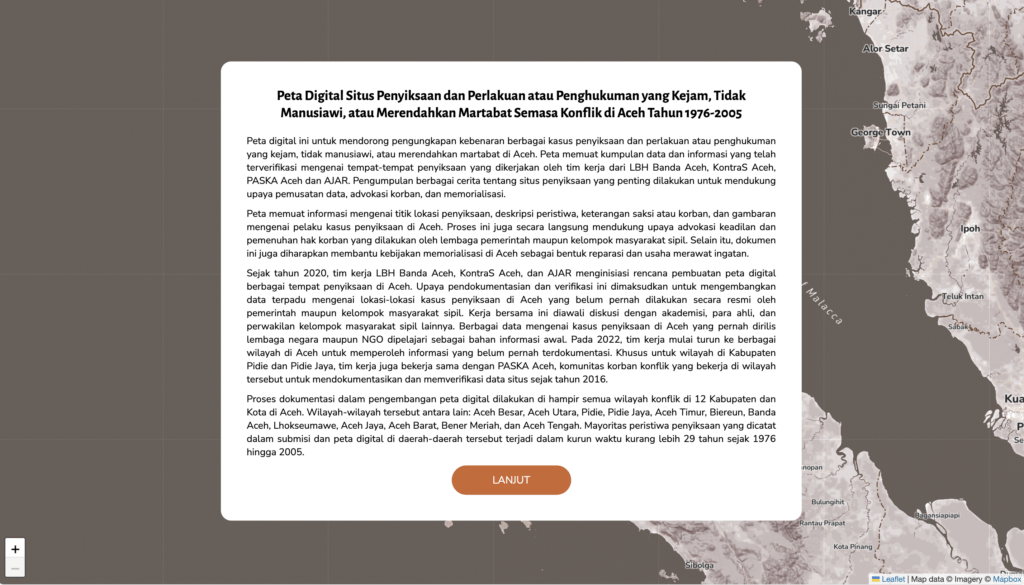Aceh, Indonesia, 30 October 2023 — Asia Justice and Rights, in collaboration with three Aceh civil society organisations, have unveiled a digital map pinpointing prisons, checkpoints, and former clandestine sites of torture and cruel, inhuman, or degrading treatment or punishment during the Aceh conflict from 1976-2005. The digital map, available as an online, interactive website, aims to document the province’s history and preserve the collective memory for future generations.

Launched on 30 October 2023 at the office of the Legal Aid Institute (LBH) in Banda Aceh, the digital map is the culmination of extensive documentation efforts across 12 conflict-affected districts and cities in Aceh. This collaborative project, spearheaded by AJAR, the Commission for Missing Persons and Victims of Violence (KontraS) Aceh, Banda Aceh’s Legal Aid Institute (LBH Banda Aceh), and the Aceh Society for Social and Economic Development (PASKA Aceh), meticulously records instances of violence and torture that occurred over a span of 29 years, from 1976 to 2005 of the conflict period in Aceh.
The digital map, accessible through sitesoftorture.asia-ajar.org, contains detailed information about locations of human rights violations in Aceh during the conflict period. According to KontraS Aceh Coordinator Azharul Husna, each documented site reveals the location of torture, descriptions of events, witness or victim testimonies, and information about perpetrators. While still a work in progress, the civil society organisations involved in this documentation project believe this digital map represents a significant step towards preserving Aceh’s history.
Husna emphasised that the digital map creation is driven by the urgency to document the history of conflict in Aceh, fearing that undocumented narratives could fade with time. This initiative not only preserves historical records but also to push for advocacy efforts by government and civil society groups to fulfill victims’ rights. Moreover, the map is expected to help shape memorialisation policies in Aceh, serving as a form of reparation and an effort to maintain collective memory.
“We want it to be like historic places overseas that are maintained for the public until now,” said Husna. She stated that the places where human rights violations occurred varied and needed to be identified when the project started in 2020, ranging from school buildings (meunasah), government offices, residential homes, to permanent and temporary police and military posts. Currently, the majority of these places have undergone significant changes, making it nearly impossible to find signs of human rights violations.
AJAR Country Manager for Indonesia, Mulki Makmun, explained that the digital map consists of 161 points or locations that are scattered across Aceh Besar, Aceh Utara, Pidie, Pidie Jaya, Aceh Timur, Biereun, Banda Aceh, Lhokseumawe, Aceh Jaya, Aceh Barat, Bener Meriah, and Aceh Tengah. The organisations involved went on several field missions to each of the district and city over the past year, visiting each as described from various CSOs reports, interviewing locals and verifying references made by academics, experts, and representatives of other civil society groups early in the process. The map currently displays sites with information dating from 1989 to 2005, marking the period leading up to the peace agreement in August 2005.
Mulki acknowledged the challenges in tracing Aceh’s history of human rights violations. While some locations like Rumoh Geudong and Simpang KKA are widely known, many remain obscure. Mulki emphasized the importance of comprehensive documentation to ensure local communities are aware of their history. Prior to the project, effort to collect integrated data on the locations of torture cases in Aceh has never been officially carried out by the government or civil society groups.
The launch of the digital map is just the first step in an ongoing process. A series of focus group discussions are planned to refine the information and ensure the accuracy of the documented sites. Additionally, a comprehensive report detailing the research and documentation process has been compiled and will be formally submitted to the Aceh Truth and Reconciliation Commission in the near future.